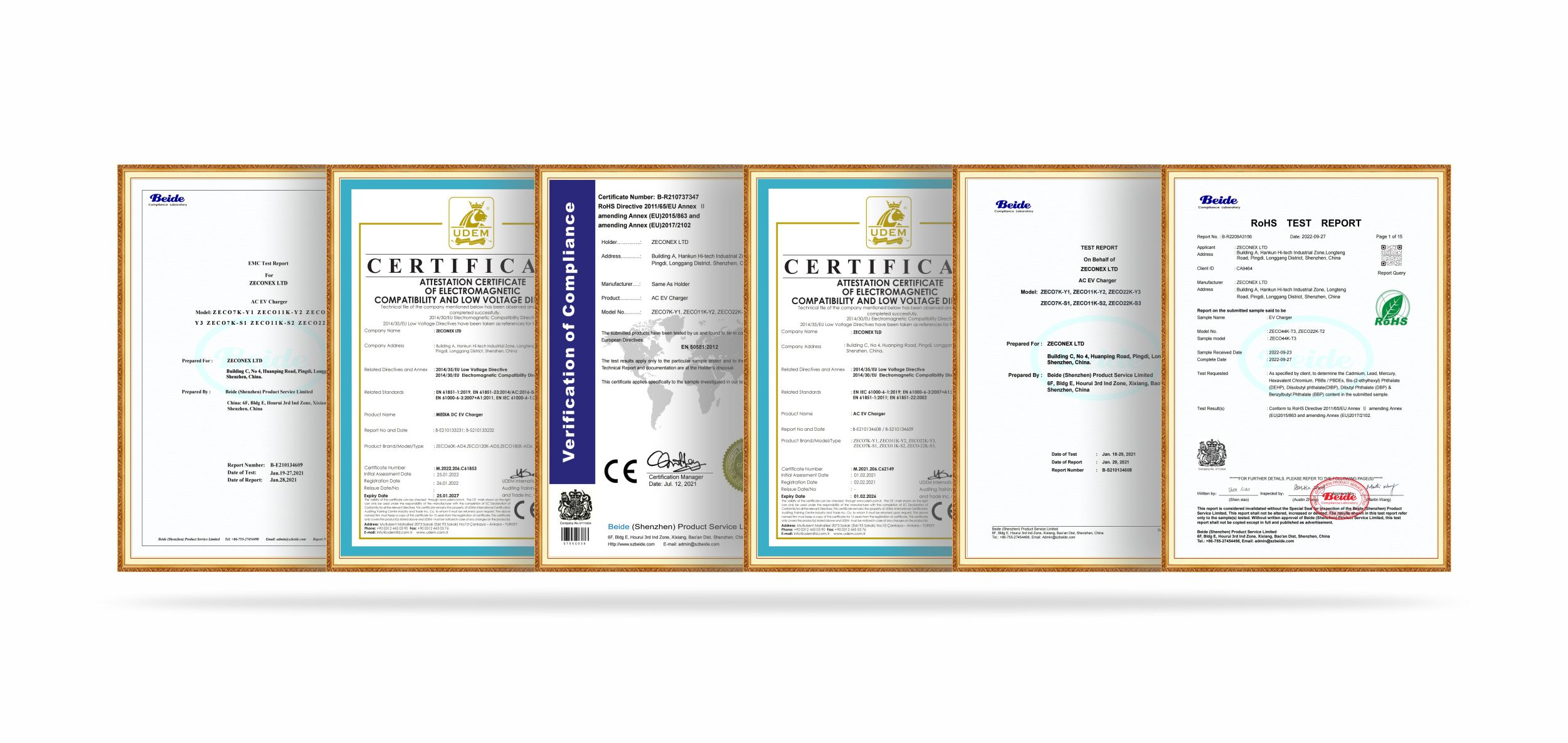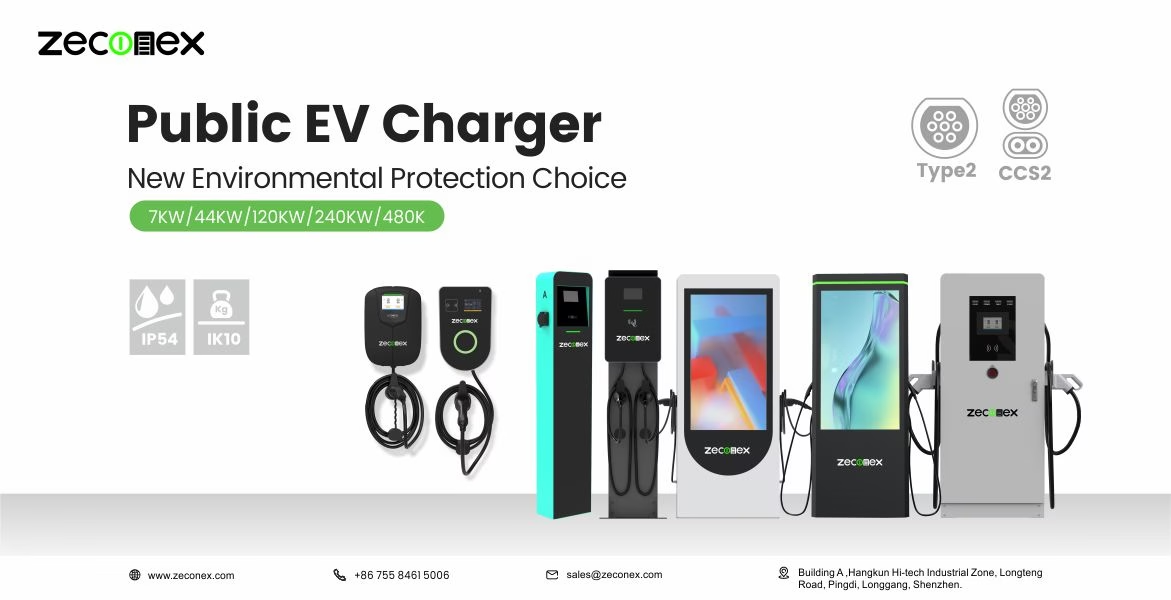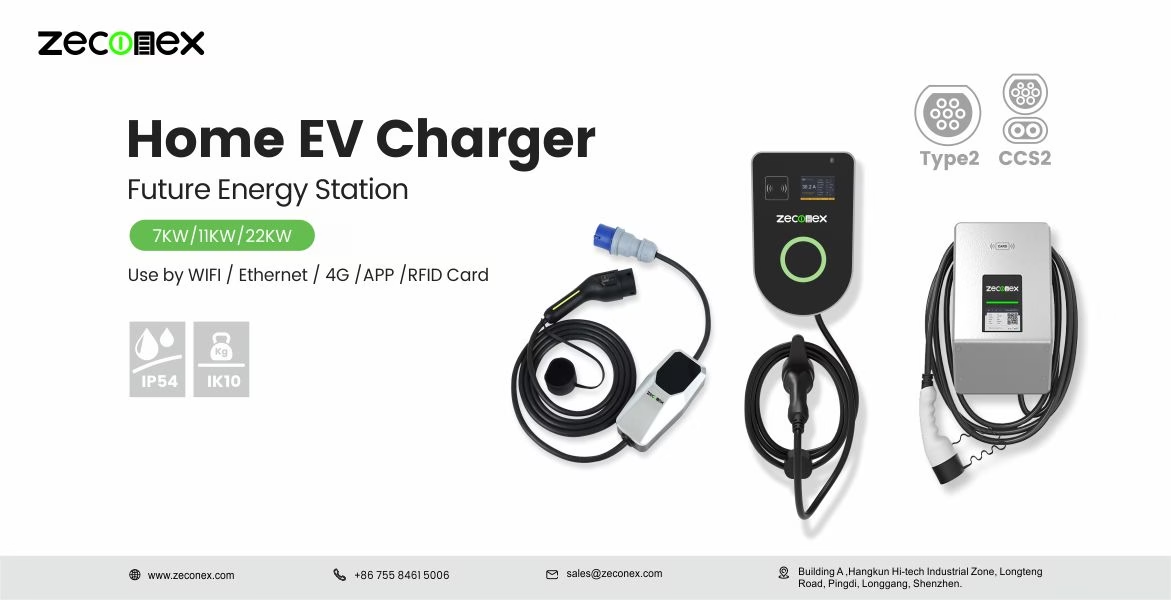In today's booming electric vehicle market, chargers, as a core accessory, have a direct impact on user experience and market competitiveness in terms of safety, compatibility and performance reliability. As a wholesaler, it is crucial to choose products that comply with international certifications and standards, and Zeconex suppliers are helping you with compliant purchasing. In this article, we will summarize the major global certification systems, regional differences in standards, and compliance strategies to help you efficiently purchase products without worry.
Analysis of Core International Certifications: “passport” for Market Access
CE Certification (EU Market)
Scope of application: EU and EFTA.
Testing standards:
Electromagnetic compatibility (EMC): such as EN 55022 (radiated interference), EN 61000-3-2 (harmonic test).
Low Voltage Directive (LVD): e.g. EN 60950-1 (electrical safety).
Importance: Products without CE marking will be prohibited from entering the EU market, and certification is a guarantee of consumer confidence in safety.
UL Certification (North American Market)
Standard focus: UL 2251 for electric vehicle charging equipment, covering high current arc ignition resistance, insulation resistance and more than 30 tests.
Factory Audit: First-time certification requires a UL factory inspection to ensure production process compliance.
Cycle time and cost: Certification takes 2-3 months, cost includes testing, factory audit and annual maintenance.
FCC Certification (U.S. Electromagnetic Compatibility)
Core Requirements: Ensure that equipment radio interference complies with FCC regulations to protect the safety of wireless communications.
Applicable scenarios: Chargers with wireless charging function need to be certified by FCC, and the offending products will be taken off the shelves.
IATF 16949 (Quality Management System for Automotive Industry)
Supply Chain Advantage: Certified companies can be prioritized as suppliers to automotive manufacturers, applicable to charging systems and their components.
EN IEC 61851 (International Electrotechnical Commission standard)
Test content: plugging and unplugging life, electromagnetic compatibility, over-voltage protection, etc., to ensure global interoperability of charging equipment.

Regional Standard Differences: Adapting to the Target Market Is the Key
China Electric Vehicle Charger Standard
Adopt GB/T 20234 standard interface, AC charging parameters for 440V AC/63A AC, DC charging parameters for 1000V DC/800A DC (support liquid cooling), and need to pass CCC certification (mandatory from 2025).
North American Electric Vehicle Charger Standards
Using J1772 (CCS1) standard interface, AC charging parameters for 240V AC/80A AC, DC charging parameters for 1000V DC/400A DC, priority through UL 2251 certification.
European Electric Vehicle Charger Standard
Adopting IEC 62196 (CCS2) standard interface, the AC charging parameter is 480V AC/63A AC, the DC charging parameter is 1000V DC/200A DC, and it needs to pass CE certification and EN IEC 61851 certification at the same time.
Japan Electric Vehicle Charger Standard
Uses CHAdeMO standard interface, focuses on DC fast charging, supports up to 400 kW, and needs to be tested by Japanese certification organizations.
Tesla Electric Vehicle Charger Standard
Adopts NACS standard interface, designed for AC/DC integration, maximum DC current is 400A DC, compatible with CCS interface circuit, need to pass Tesla's exclusive certification process.

Wholesaler Strategy:
Market Matching: Select the corresponding standard products according to the export region (e.g. CE+EN IEC 61851 is required for selling to Europe).
Compatibility testing: When selling to multiple regions, prioritize chargers that support multiple standards (e.g. CCS1/CCS2).
Compliance Sourcing Suggestions: Reduce Risks, Enhance Efficiency
Supplier Screening
Certification qualification: Prioritize manufacturers that are certified in the target market (e.g. UL, CE).
Factory audit: Require suppliers to provide IATF 16949 or ISO 9001 quality management system certificates.
Product Verification
Test reports: Request third-party laboratory test reports (e.g., UL, TÜV Rheinland).
Marking check: Confirm that products are labeled with CE, FCC and other compliance marks to avoid counterfeiting.
Dynamic Compliance
Standards Updates: Pay attention to International Electrotechnical Commission (IEC) and regional standards revisions (e.g., China's new standard for overcharging).
Inventory turnover: Digest old inventory during certification transition period (e.g., China CCC certification 1-year 5-month buffer period).
Cooperation Support
Certification agent: not familiar with the international market, can be entrusted to the certification body to assist in the application (such as FCC certification agent).

Compliance Is the Cornerstone of Long-Term Competitiveness
In the global competition for electric vehicles, international certification is not only a threshold for market access, but also a commitment to quality. As a wholesaler, choosing compliant products can help you avoid legal risks, enhance customer trust and ultimately achieve sustainable growth, with Zeconex as a specialized supplier to help your partners expand globally without any worries. Feel free to contact the Zeconex team!
